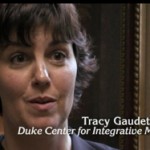In this post (one of several I think of as notebook entries) I’ve put together several ideas about healing that underlie the work of Michael Lerner and Rachel Naomi Remen. What sets them apart for me are their insights about the comprehensive process by which people not only learn to live with chronic illness but often change their whole orientation to life.
Their work at the Commonweal Cancer Help Center was featured in the final segment of Bill Moyers’ Healing and the Mind, the book version of the PBS series
of the early 1990s. More recently, I’ve been drawn to Rachel Naomi Remen’s stories dramatizing the healing process in her Kitchen Table Wisdom
and My Grandfather’s Blessings
.
Their approach to healing caught my attention when I was dealing with cancer. Since then, I’ve found it especially powerful in helping to heal the severe, chronic depression that has damaged my life far more than cancer ever could – despite all the fear aroused by that diagnosis. But the process of healing from both became for me a life changing experience. That is the focus of their work on healing, addressing the challenge to the will to life itself.
Here are a few of my notes about what I’ve learned from their work. I don’t claim that these interpretations do justice to their ideas, especially those of Rachel Naomi Remen. She expresses her insights through brief yet moving stories rather than abstract explanations. They make an emotional connection that thinking can only catch up with later on.
Those connections have helped keep me going through many years of trying to get my life back from depression. Most important, they’ve given me a broader sense of what recovery is all about. Instead of focusing on symptoms, I’ve learned to see the process in terms of my whole life.
(Page references are to Healing and the Mind, unless otherwise noted.)
- Healing and Curing: There’s an important difference between healing and curing. In their view, curing deals with the symptoms of disease at the biological level. That’s the main concern of scientific medicine in the western tradition. Healing, on the other hand, deals with the whole person, at emotional, mental and spiritual as well as physical and biological levels.
This is like the distinction that is often made between disease and illness. Disease refers to the biomedical symptoms and changes in biological processes within the body. Illness is the human experience of the disease. A hundred people can have the same symptoms of a disease but have completely different experiences of those biological changes in terms of the subjective awareness of the illness. As Michael Lerner puts it:
For a cure to work in mainstream medicine, the biological and psychobiological healing response of the individual has to be functioning. Healing comes from inner resources. … [A]t the very simple biological level, mainstream medicine does not make a wound heal. It creates the conditions under which the tissue can knit back together. What we bring to the encounter with any life-threatening illness is our healing resources, our healing potential. (p. 324)
Lerner emphasizes that western scientific medicine and alternative treatments should go hand in hand. In fact, he doesn’t use the word “alternative” but prefers “complementary” or “adjunctive.” By combining western medicine, meditation, acupuncture, exercise and nutrition, for example, healing can take place on many levels. Each person needs to find the right treatments through their own experience rather than automatically ruling anything out.
- Empowerment: One of the turning points for me was feeling a sense of empowerment and believing that I needed to make my own decisions about treatment, rather than wait for a medical prescription to make me feel better. I’ve tended to express this in terms of taking charge, fighting back, becoming my own best champion of recovery, etc. Rachel Remen sees that change as an important effect of empowerment but turns her attention to the inner process that makes it possible. Fear has to be taken away first.
It [the Commonweal program] doesn’t take the cancer away. It takes the fear away. And when the fear is taken away, people are empowered to deal with whatever they need to deal with and to seek and find meaning in the events of their lives.
- Letting Go:A strange resistance to healing can also block that sense of inner strength and empowerment. I’ve heard many describe this as a fear of being defeated by depression. Talking about it with a therapist, for example, would only pull them into it more deeply and concede its reality. Referring to it as a disability at work would be a colossal surrender and admission of humiliating weakness. In my case, that resistance usually took the form of denial, even when the stress of dealing with the inner turmoil was unbearable.
Somehow, the resistance needs to be released so that healing has a chance to begin. In My Grandfather’s Blessings, Remen tells the story of a man who refused treatment because he felt that by accepting the need for it, he’d be surrendering authority over himself to the illness. He thought of the disease as a great black hole, and he resisted being pulled into it with all his strength. However, when he imagined himself letting go and being drawn into this hole, in its darkness he found a profound healing.” (p. 41)
Too often I hear people talking about “letting go” as a simple decision, like releasing a balloon to float away. This story brings out the great sense of risk involved and the courage to accept the loss of control. Ultimately, I think everyone has to take that chance on the unknown in order to heal.
- Trust and Healing Relationships: Though I have usually seen myself as a loner while trying to recover, the process can’t occur solely within the individual. That’s been a hard one for me to recognize, not only because I’m such an introvert, but also because most therapists and natural healers work with me one-on-one and concentrate only on what’s happening during a session. But in a larger sense, recovery is about relationships. Rebuilding trust and the ability to talk openly with my wife, for example, has been critical to getting better.
Learning from the online community has also been important, largely because we share such deep experiences with depression. We’ve all been there and know exactly what the problems are – no jargon, no theory, no fixing by a professional, just the honest exchanges among people who can trust each other, despite the fact that the relationship is all online. Remen puts it this way.
Healing is natural. It’s not something I [as a doctor] do to you but something that is mutual, that comes out of the integrity of the relationship between us. So both of us will be healed in the process. … All people are wounded, but the people who come here can’t cover it up the way the rest of us do … And because the participants can’t cover up their woundedness, … they can trust each other. … I can trust another person only if I can sense that they, too, have woundedness, have pain, have fear. Out of that trust we can begin to pay attention to our wounds and to each other’s wounds – and to heal and be healed.
For a long time, I could only think about getting rid of the symptoms of depression. They were slowly killing me off, and stopping them was the only goal I had. Yet, it wasn’t until I shifted my attention to wellbeing and the ways I needed to change my outlook on life as a whole that recovery of any sort started to take hold. Where are you in this long process of trying to end depression?




Mental healing can take so much time. But I feel that as long as you are progressing just that little bit each day you are heading in the right direction. I think having a supportive community around you certainly helps the process and stops you feeling isolated and that you’re going through it alone.
Mental illness is not shameful. It’s just like physical illness just more crucial. One should consult their doctor if they are feeling any type of mental illness. Great post informing about mental illness and accepting it. I read this article that says about talking to oneself when having a mental illness. It’s a good one to read. hope it will help your readers too. Article: https://yourmentalhealthpal.com/what-mental-illness-makes-you-talk-to-yourself/
Just a thought: so much focus today is on “toxic people” around us. I bet I have watced every YouTube video made about toxic narcissistic people. I have gone No Contact with many former loved ones as an antidote to their toxic venom. And their indifference. And their own decisions to move on from a nebulous relationship. It is easy to shift the blame to others. If they are the bad guys in all of this, and they are responsible for my feeling depressed all the time, then I don’t have any responsibility except to dump them. Heave-ho with the bad ballast. Then I can rise. Today, John, as I start reading your ebook “A Mind for Life” it suddenly occurs to me that it maybe, just maybe, depression is what is toxic. It is the toxic lens through which I view other people, through which I view life events, through which I struggle to see things clearly so I can move forward.
Excellent question. Where am I in this life-long process of trying to end depression. My mistake has been trying to end it. And when there is no ending of it, what remains is “the-on-and-on-ness of it” as a Downton Abbey character said of raising children. I have had no children. Depression has seemed like my Demon Seed child, one that has been gestating for over 50 years. I can’t give birth to it and let it go have it’s own life. It keeps feeding on me. Now it is a symbiotic thing — we rely on each other. I feed on it when I am angry and anxious and cannot cross that threshold to “letting go” or “radical acceptance.” I hate it but I would have to kill me to kill the depression…or so it seems.
Yet I continue in hope that this is not true. Life with depression is still much to be desired over simply ceasing to be. I tend to it like I would a disabled child — shielding it from the bullies and the naive hurtful questions like, “Why don’t you ever join in?” “Why is that blight of sorrow on your face all the time?” “How come you don’t act like the rest of us?” I don’t want to sound like depression is me and I am depression — that is not true. But after a life full of it, full to bursting with it, I do have times when I want to yell obscenities, “Yes #%&@ I am depressed! I am &%@$# anxious!” I want that to be my Acceptance Speech for a Lifetime Achievement Oscar. All those times I have acted happy, smiled, when I was miserable. Oscar-worthy. Trying to be socially acceptable at family holidays. Oscar-worthy. Taking part at office parties, fishing with my dad, sitting in Sunday Morning classes at church with a pleasantness I don’t feel. Oscar-worthy.
This Year of the Pandemic, though, I didn’t have to act or pretend anymore. Everyone is feeling anxious and depressed. No one is pressuring me to “think positive.” But in this process of easing depression, if not ending it, this year has given me the time and space to DO A GREAT WORK OF HEALING in myself. I have taken lots of time to journal, to read articles about learning to identify my emotions, to watch videos about taking care of myself and limiting exposure to toxic people. I have realized why my Dad was such a mountain of steadily flowing hot lava, why my Mom taught me to duck and run, how so many life events have combined to set me on my current course. I think I have used this year wisely.
Less depressed now? Not sure. I am much more anxious because I’m trying to process and/or accept or let go or even try to forget some of the bad and to remember there was also good. It stirred up a lot of bad stuff that will take a while to settle. But I think it IS GOING TO SETTLE, and that is the good healthy part. I think that now, in 2021, at age 62 I can lay it down and grieve over its passing.
Then I will continue in absorbing all the good things my sense go out and gather and bring back to me. This is the healing.